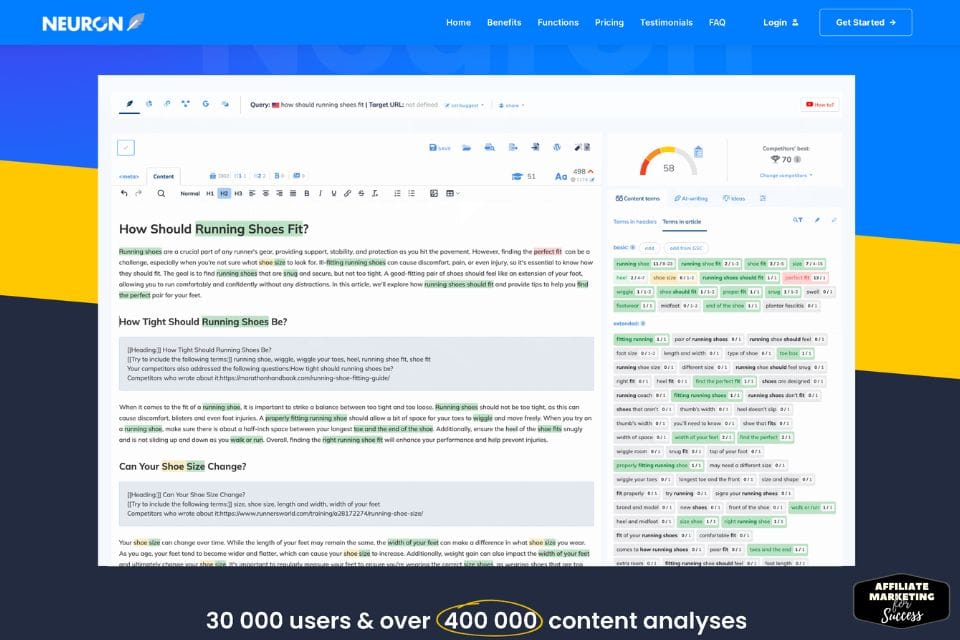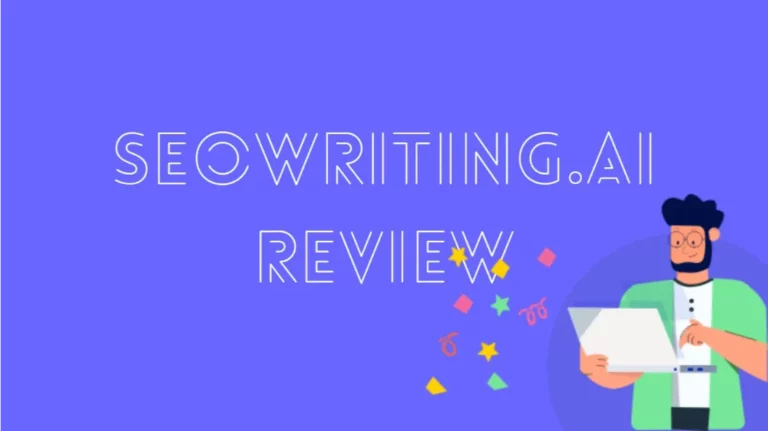NeuronWriter Review 2026: The No-BS Breakdown
Related Guides
Quick Answer
NeuronWriter can improve affiliate content rankings when used for semantic coverage, competitor gap analysis, and intent alignment—but your final edge comes from first-hand insights, real examples, and stronger internal linking.
Best for: Affiliate bloggers scaling SEO content with clear workflows.
Not ideal for: Fully automated, low-trust content publishing.
NeuronWriter vs Alternatives (Fast Decision)
- Choose NeuronWriter if you want budget-friendly semantic optimization workflows.
- Choose premium alternatives if you need larger enterprise content ops features.
How this review is maintained
- Author: Alexios Papaioannou
- Method: Tool analysis, SERP context review, and practical affiliate SEO use-cases.
- Disclosure: This page may include affiliate links; recommendations prioritize fit and usability.
Bottom line up front: NeuronWriter is an AI-powered SEO content editor that helps you write content Google actually wants to rank. It combines NLP analysis, competitor research, and AI writing assistance in one dashboard. If you’re serious about SEO for your blog, this tool deserves your attention.
Let’s get into it.
NeuronWriter
AI-Powered SEO Content Optimization Tool
- ✅ NLP-based content scoring & optimization
- ✅ Real-time SERP competitor analysis
- ✅ AI writing assistant built-in
- ✅ Content planning & project management
- ✅ Affordable lifetime deals available
*Affiliate link – we may earn a commission at no extra cost to you
What Is NeuronWriter? (30-Second Explanation)

NeuronWriter is a content optimization platform that tells you exactly what to include in your content to outrank competitors.
Here’s how it works:
- You enter your target keyword
- NeuronWriter analyzes the top 30 Google results
- It extracts NLP terms, headings, questions, and semantic relationships
- You get a real-time content score as you write
- The AI assistant helps you generate optimized content
Think of it as having an SEO writing expert looking over your shoulder, telling you exactly what’s missing from your content.
Who Is This For?
NeuronWriter is built for:
- Bloggers who want to improve their search rankings
- Affiliate marketers building content sites
- SEO agencies managing multiple client projects
- Content teams needing data-driven briefs
- Anyone tired of guessing what Google wants
If you’re just starting your affiliate marketing website, this tool can shortcut months of trial and error.
The Features That Actually Matter

1. NLP-Based Content Analysis
This is the core of NeuronWriter. It uses Natural Language Processing to understand what terms, entities, and concepts Google associates with your keyword.
Not just “keywords to sprinkle in”—actual semantic relationships that Google’s algorithm looks for. This is the same technology behind AI-powered semantic clustering that’s dominating modern SEO.
2. Competitor Content Analysis
NeuronWriter pulls data from the top-ranking pages and shows you:
- What headings they use
- What questions they answer
- Their word count and content structure
- The NLP terms they’re optimized for
This alone saves hours of manual research. If you’re following Google ranking factors, you know competitor analysis is non-negotiable.
3. AI Writing Assistant
The built-in AI can generate content, expand paragraphs, and rewrite sections. It’s not perfect—no AI is—but it’s useful for:
- Overcoming writer’s block
- Generating first drafts quickly
- Creating variations of content
Pro tip: Use it as a starting point, then refine with your expertise. If you want to go deeper on AI writing, check out how to write with Claude 2 for comparison.
4. Content Planning & Project Management
You can organize your content in projects, track progress, and plan entire content calendars. This is huge for building a winning content strategy at scale.
Helpful Video: NeuronWriter in Action
Want to see how NeuronWriter actually works? This walkthrough breaks it down:
NeuronWriter Pricing: Is It Worth It?

Here’s where NeuronWriter stands out: it’s significantly cheaper than alternatives like Surfer SEO or Clearscope.
Monthly plans start around $19-49/month depending on features. But here’s the move: they frequently offer lifetime deals on AppSumo and similar platforms.
If you can grab a lifetime deal, the ROI is insane. One well-ranked article can pay for the entire tool forever.
Compare this to something like Semrush at $100+/month, and the value proposition becomes clear.
NeuronWriter vs. The Competition
| Feature | NeuronWriter | Surfer SEO | Frase |
|---|---|---|---|
| NLP Analysis | ✅ | ✅ | ✅ |
| AI Writing | ✅ | ✅ | ✅ |
| Lifetime Deal Option | ✅ | ❌ | ❌ |
| Starting Price | ~$19/mo | ~$89/mo | ~$15/mo |
| Project Management | ✅ | Limited | ✅ |
For a deeper comparison of SEO writing tools, see our Frase review.
The Honest Pros and Cons

✅ What I Like:
- Price-to-value ratio is excellent — especially with lifetime deals
- NLP recommendations are actionable — not vague suggestions
- Clean interface — doesn’t overwhelm you with data
- Good for teams — project management features actually work
- Regular updates — the team actively improves the product
❌ What Could Be Better:
- AI writing quality varies — still needs human editing
- Learning curve for beginners — understanding NLP terms takes time
- Limited integrations — no direct WordPress plugin (yet)
- Smaller user community — fewer tutorials than Surfer SEO
How to Get Maximum Value from NeuronWriter
Here’s my framework for using this tool effectively:
- Start with keyword research — Use the importance of keyword research principles first
- Analyze top 10 competitors — Don’t just look at #1, patterns emerge across top results
- Build your outline using competitor headings — Then add your unique angle
- Write for the content score, but don’t obsess — Aim for 70%+, not 100%
- Use AI for drafts, humans for polish — The AI gets you 70% there
- Track rankings after publishing — Iterate based on results
If you’re building an affiliate marketing strategy, this process compounds over time.
🚀 Ready to Rank Higher?
Stop guessing what Google wants. Let NeuronWriter show you exactly what to write.
What You Get:
- NLP content optimization
- Competitor analysis dashboard
- AI writing assistant
- Project management tools
- Regular feature updates
GET STARTED WITH NEURONWRITER →
*Affiliate link – supports our content at no extra cost to you
Who Should NOT Buy NeuronWriter

Let me be straight with you—this tool isn’t for everyone:
- If you’re not publishing content regularly — The ROI only works with volume
- If you don’t understand basic SEO — Learn basic SEO technical foundations first
- If you expect magic — Tools don’t replace strategy and execution
- If you’re on a $0 budget — There are free alternatives (just less powerful)
Final Verdict: Should You Buy NeuronWriter?
My recommendation: Yes, if you’re serious about content-driven SEO.
Here’s my logic:
- The tool pays for itself with ONE well-ranked article
- It removes guesswork from content optimization
- The price point makes it accessible (unlike $200+/month enterprise tools)
- Lifetime deals make it a no-brainer investment
Is it perfect? No. Will it guarantee rankings? Nothing can. But it dramatically improves your odds of creating content that actually competes.
If you’re building successful affiliate marketing assets, tools like this separate hobbyists from professionals.
Frequently Asked Questions
Is NeuronWriter better than Surfer SEO?
They’re comparable in features, but NeuronWriter wins on price—especially with lifetime deals. Surfer has a larger community and more integrations. For most users, NeuronWriter delivers 90% of the value at 30% of the cost.
Can NeuronWriter write articles for me?
It has AI writing features, but think of it as an assistant, not a replacement. The AI helps with drafts and suggestions—you still need human oversight for quality. For more on AI content creation, see our guide on how ChatGPT has changed SEO.
Does NeuronWriter work for any language?
Yes, it supports multiple languages. The NLP analysis adapts to the language of your target SERP.
How long until I see results?
Content ranking typically takes 2-6 months depending on competition and domain authority. The tool improves your content quality—Google’s timeline is Google’s timeline.
Next Steps
If you’re ready to level up your content game:
- Try NeuronWriter and run your first content analysis
- Read our guide to writing high-ranking blog posts
- Check out related tools in our blog
Stop hoping your content ranks. Start knowing it will.
— The Affiliate Marketing for Success Team
I’m Alexios Papaioannou, an experienced affiliate marketer and content creator. With a decade of expertise, I excel in crafting engaging blog posts to boost your brand. My love for running fuels my creativity. Let’s create exceptional content together!







